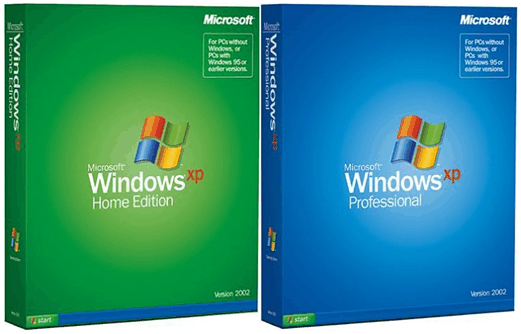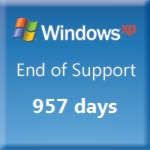| Windows XP 10 years on |
| Written by Historian | |||
| Wednesday, 24 August 2011 | |||
|
How long have we been using Windows XP? The answer could be 10 long years given that Microsoft released copies to PC manufacturers on August 24, 2011.
Windows XP arrived in a very different climate. At the time Mike James,in his 5-page preview of the soon-to-be-released operating system in the UK print magazine Computer Shopper, asked: Are you ready for yet another new version of Windows? Just got used to the fact that NT is now Windows 2000 and 98 has been overtaken by Windows Me? Well next in line is Windows XP. You might be wondering why we have to have a new version of Windows every five minutes? The cynical answer is because Microsoft needs to make some money and indeed there have been rumours that the whole XP program has been speeded up because revenues from Windows 2000, and Office 2000 in particular, haven’t been up to the projections. A less cynical, but only just, answer is that Microsoft has been trying to get Windows right ever since the first version. While in development XP was codenamed Whistler and Mike James comments: I don’t know how Microsoft picks the code names for its projects, but in the past they have always been right for the go-ahead tough technology image that they probably wanted to convey – Chicago, Daytona, Memphis and so on. Now we have Whistler, which, I’m afraid just makes me think of “Whistler’s Mother”, the famous painting of a homely old dear sitting in a rocking chair. Well, codenames aside, Whistler was the project to create operating system that Windows 2000 should have been on the desktop PC. Whistler is the first operating system using the NT (Windows 2000) kernel and supporting code to be designated as the Microsoft operating system to use on a single-user non-server PC. While there have been versions of NT and Windows 2000 that were aimed at the “workstation”, users have always had the option, and mostly taken advantage of, the availability of Windows 95, 98 and even Me in preference to using them. Now you have no choice; it’s Windows NT code for everyone… If you thought you were reading a review of Windows XP and are confused by all this talk of “Whistler” don’t be because they are one and the same thing. Presumably motivated by the fact that Windows 98 SE and Windows Me were already on the market, Microsoft went in search of a two-letter suffix for Whistler and for some strange reason decided on XP for eXPerience. Windows XP is the first mass-market desktop operating system to be based on NT. It is supposed to be as easy to use as Windows 98SE/ME and, at the same time, better. Currently Microsoft has announced two versions of XP – Home and Professional - with Professional supporting more “server” facilities.
In a comment that we now have to see as a sign of the times the "Getting Started" section opens: The first thing that has to be said about XP is that it is no lightweight! One of the many failings of Windows NT is that it has always been resource-hungry and XP is no exception. The minimum recommended RAM is 128Mbytes, which is of course only half what Microsoft thinks you should really use! You also need 2GBytes of free space and a fast processor. On the 500MHz Athlon machine I tested it on most it was distinctly sluggish and I would have been considering an upgrade to 1GHz! After a detailed account of his early experiences with the OS, the review's verdict reads: Windows XP is a step that Microsoft has to take in the development of the Windows operating system but it certainly isn’t one users have to take at all soon. Given its need for lots of computing power, and its inability to cope with a wide range of hardware, the best advice is to probably wait until you have to buy a new machine and get it pre-installed. It looks cute but it doesn’t have anything that makes it a must-have upgrade. It is also clear that the Windows Product Activation copy protection system is going to put a lot of home users off buying any Microsoft products. Perhaps now is the best time to give Linux a try. Since Windows XP we had the even more badly received Windows Vista which had the effect of extending XP's active life and it was only in October 2010 that XP was no longer allowed to be pre-installed on new PCs. Now Windows 7 is the OS that comes as standard and Microsoft has had some success in persuading its existing customers to upgrade - largely as an escape route from Vista. Many users, however, continue to cling to XP; Forrester Research estimated that in March 2011 nearly 60 percent of systems were still running it in . However, as we reported in Microsoft counts down to XP death it has a finite future and will be forcibly retired in April 2014.
If you would like to be informed about new articles on I Programmer you can either follow us on Twitter or Facebook or you can subscribe to our weekly newsletter.
|
|||
| Last Updated ( Wednesday, 24 August 2011 ) |


